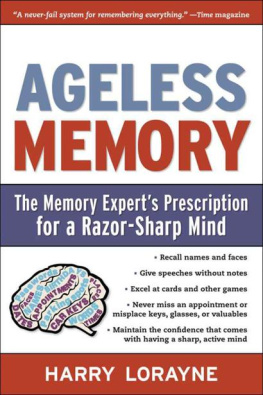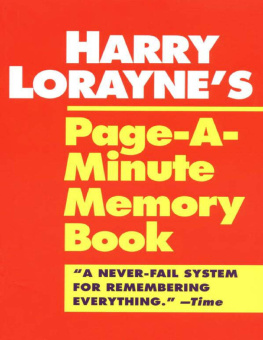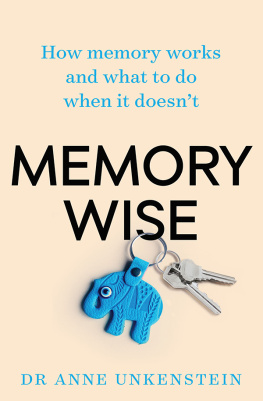AGELESS MEMORY
AGELESS MEMORY
The Memory Experts Prescription for a Razor-Sharp Mind
Harry Lorayne

Copyright 2007 by Harry Lorayne, Inc
All rights reserved. No part of this book, either text or illustration, may be used or reproduced in any form without prior written permission from the publisher.
Published by
Black Dog & Leventhal Publishers, Inc.
151 West 19th Street
New York, NY 10011
Distributed by
Workman Publishing Company
225 Varick Street
New York, NY 10014
Manufactured in the United States of America
Cover design by Amy Wahlfield
Interiors by Liz Trovato Book Design
Cover illustration by Daberko Design
ISBN-13: 978-1-57912-824-1
First trade paperback edition 2009
Originally published in hardcover in 2007 as Ageless Memory: Simple Secrets
for Keeping Your Brain Young
h g f e d c b a
Library of Congress Cataloging-in-Publication Data is on file at the office of the publisher.
ACKNOWLEDGMENTS
Special thanks to J.P. Leventhal (publisher), Laura Ross (editor), and Jim Mustich. Without them you would not be holding this book right now.
For Rene Lorayne and Robert Loraynewhat great memories theyve given me.
Contents
.
.
.
.
.
.
.
.
.
.
.
.
.
.
.
.
.
Preface: In the Eye of the Be Older
Before I forget... Ive been asked this question many times. Ive answered it before. But because this book will be my legacy Ill answer it againbefore I forgetquickly and succinctly. Oh yes, the question:
How did I, a dese, dem, and dose kid from the ghetto of Manhattans Lower East Side, become the man with the most phenomenal memory in the world, the Yoda of memory training (Time magazine, June 2001), the worlds foremost memory-training specialist?
It started when I was about eleven years old. Mrs. Goldfisher gave a ten-question test every day. Shed grade each one and we had to take it home so that one parent could sign it. My father (he died when I was twelve) was the signee, and he punished me just about every school day. BecauseI kept getting failing grades, 40s and 50s.
Mrs. Goldfisher said to me more than once, Harry, youre a seemingly intelligent boy; how come you cant pass these simple tests? Good question. And it took quite some time before the answer, the bright light, appeared: a simple, pretty obvious thought that felt to me like an epiphany, an apocalypse, a seminal idea.
The test questions were simple enough. Who is the vice president of the United States? I didnt know. Whats the capital of Maryland? I didnt know. Whats the main export of Germany? I didnt know. The breakthrough came, the bright light danced inside my mind when I realized that I kept saying, thinking, the phrase I dont know. The word know did a few laps around the mental track. Wait a darn minute! Knowing doesnt have as much to do with intelligence as it does with remembering. Mrs. G. never asked a test question that hadnt been mentioned or read in class. When I said to myself, I dont know, I really meant, I dont remember.
Theres no way to intellectualize (I didnt know that word way back then) the capital of a state or the main export of a country. You either know it or you dont. I realized right then that know, in this context, means the same as remember. I dont remember! (I didnt realize at the time, nor did anyone else since there was no such word, that I was [and am] lysdexicsorry, I mean dyslexic.)
Oh, my gosh. I realized, if I could learn to remember, Id get passing grades on these damn tests and, more urgent at the time, my father would stop punishing me. (I once told this story on The Tonight Show and included the fact that my father hit me. Negative calls and letters poured into the station. Cant say hit me. Punished me is okay.)
But I obviously had, or thought I had, a lousy memory. (I found out soon enough that there is no such thing.) How can I make myself remember the facts I hear and read in class? In the local library I asked the lady behind the desk (I can still see her in my mind: long black dress, gray hair in a large back-of-the-head bun) if there were any books that teach people how to remember. She directed me to a room way off in an uninhabited corner. I found books on memory training dating back to the seventeenth century. I didnt understand most of what I read; after all, I was only eleven years old. But the tiny fraction I did understandreally, one simple ideachanged my life.
I manipulated that one simple idea so that it worked for me in school, so that it enabled me to remember a fact. And then, when the relevant question appeared on a test, I mentally, joyfully screamed, I know it! I know it! I had figured out that know and remember are synonyms; they mean the same thing. If you remember something, you know it; and if you know ityouve remembered it. (Youve also learned it.)
Well, my father stopped punishing me and I started to teach that simple idea to a few of my classmates. And the years went by. I toyed with that simple idea, enlarged it, twisted and manipulated it so that it worked for any kind of information. I became, and am, a motivational speaker. I motivate people to learn how to remember easily and effectively, and to use more, much more, than the proverbial 10 percent of their mental capacities.
I have written many books on the subject, my systems are taught in schools all over the world, and top corporations teach the systems as part of their training programs. Ive been written about in literally thousands of magazines and newspapers, and Ive written for many of them, too. Ive lectured and conducted seminars all over the world: in Australia, Japan, the Philippines, and all over Europe; and Ive appeared on major television shows worldwide. In The Book of Genius (Stanley Paul Publishers, 1994) theres a paragraph or two talking about a record I set which may never be broken, that of having met and remembered the names and faces of more than 7,500,000 people during my career, up to that time.
Time drags you into an alley and beats the ____ out of you!
Mel Brooks
Yes, time does beat the ____ out of us, physically and mentally. Whats that great, erudite clich? Oh, yes: growing old sucks! In the movie All About Eve, Bette Davis says about growing old, It aint for sissies!
Well, theres another, more recent clich: Eighty is the new sixty. (You fill in the ages.)
When it comes to aging, the emphasis, of course, has always been on the physical, and thats probably as it should be. But, Im here to put some emphasis on the mental, particularly for usand heres that phrase againsenior citizens. Youre going to read this a few times in this book because I cant stress it enough: It is no longer necessary to accept poor memory, waning memory, loss of memory, or senior moments as an inevitable part of growing older!
With my help, not only will you acquire a memory you never imagined you could have, but you will have it for the rest of your life!
Through the years, Ive had many discussions with medical people who have told me that applying my trained-memory systems can hold back senility, even Alzheimers. Some explained it to me in technical medical terms, how applying my systems sends more blood to and through the brain, and so forth.
Here is some of the medical evidence Ive collected that speaks particularly to those of us over 50. And, sorry to disappoint you but this will be the last of any technical talk. Nothing wrong with technical talk, of course, but thats not my thing. Im too results-oriented. Im interested in giving you a fantastic memorythats all. But the following quotes are important because they make the point for me.
Next page





